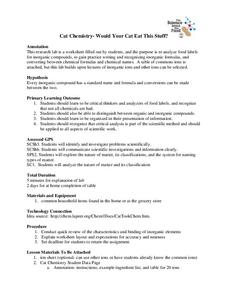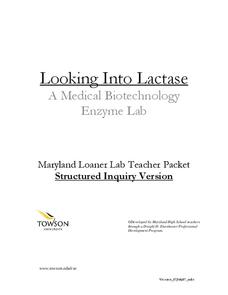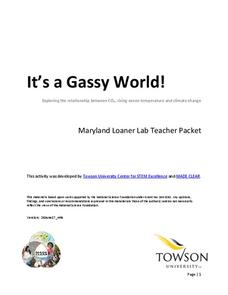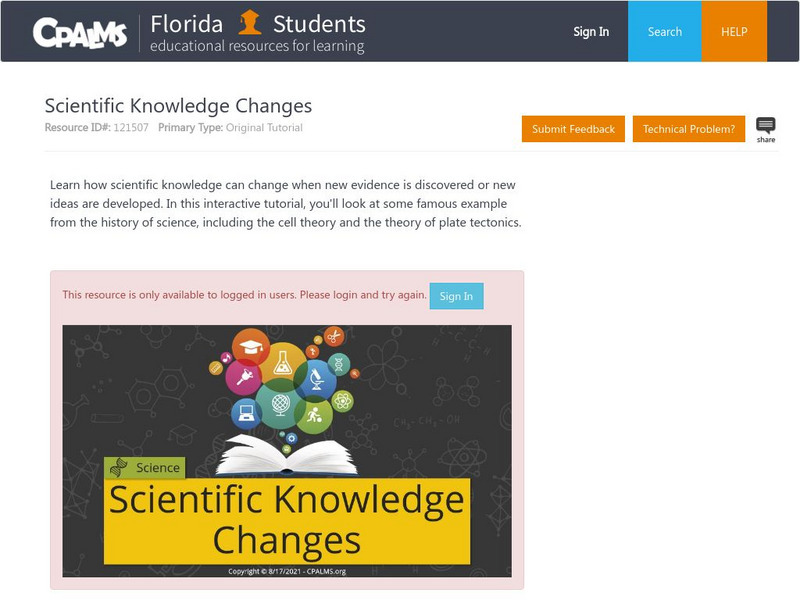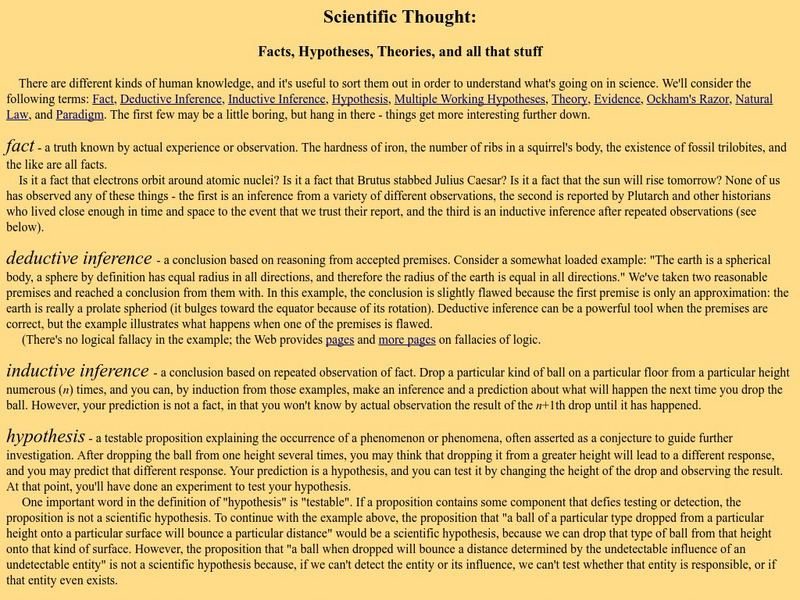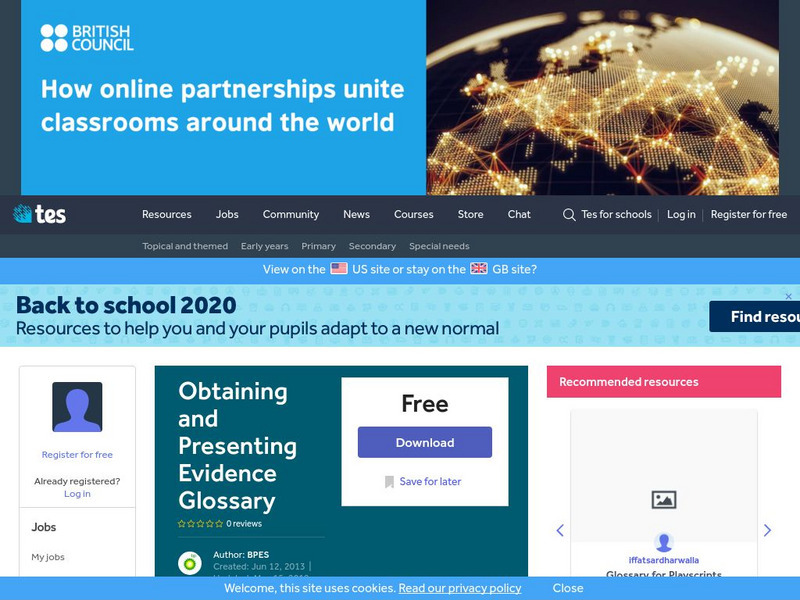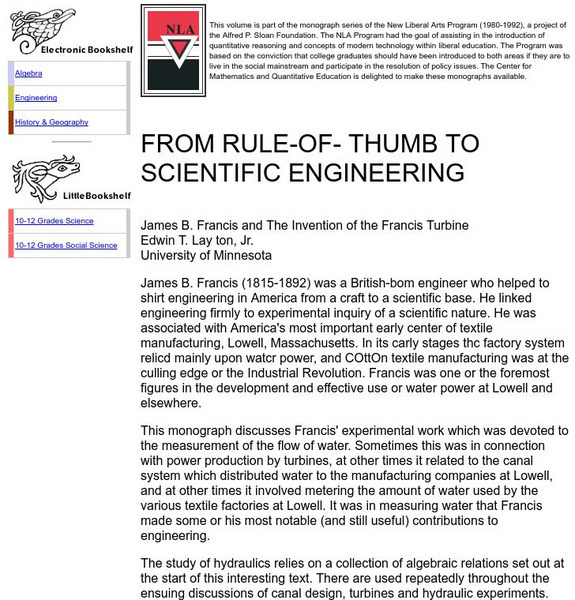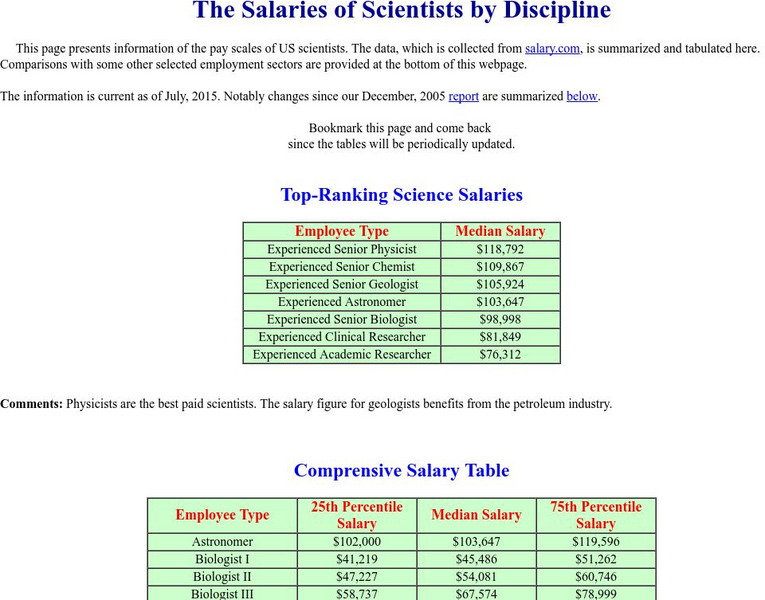Berkshire Museum
Backyard Rocks
You don't have to travel far to learn about rocks, just step outside, pick up a stone, and begin investigating. After taking a class walk around the school grounds collecting rocks, young scientists practice their skills of observation...
Towson University
Looking Into Lactase: Guided Inquiry
Milk does a body good ... unless, of course, someone is lactose intolerant. Pupils play the role of pharmaceutical scientists in a guided inquiry lab about lactase. Lab groups collaborate to learn more about lactose intolerance, how...
Cornell University
What is IPM?
Discover what a pest is and how to identify one with a lesson that looks closely at our outside world and taxonomy. Scholars investigate insects and plants to practice their identification skills, take a survey, and explore the...
University of Georgia
Would Your Cat Eat This Stuff?
Processed foods use inorganic compounds for flavoring and preservation. This take-home laboratory challenges scholars to find 20 different compounds identified on the labels of foods to list on their data collection sheet. The activity...
It's About Time
The Nitrogen and Phosphorous Cycles
How do we affect the ecosystem, and what can we do to preserve it? Pupils explore chemicals that promote and inhibit plant growth, then discuss the importance of nitrogen and phosphorus to the survival of organisms and describe how...
Towson University
Looking Into Lactase: Structured Inquiry
Why is lactase important? Biology scholars explore enzyme function in a structured inquiry lab. The activity tasks lab groups with observing how temperature and pH affect enzyme activity, as well as determining which milk products...
Information is Beautiful
How Many Gigatons of Carbon Dioxide...?
Here is an interesting infographic that presents information on the amount of carbon dioxide we can safely release into the atmosphere compared to the actual amount we have released to date.
Towson University
It's a Gassy World!
How much does your class know about the relationship between climate change and carbon dioxide? Science scholars explore the nature of greenhouse gases and rising ocean temperature through demonstrations, research, and experiments. The...
National WWII Museum
A New War Weapon to Save Lives
Young historians view and analyze photos and documents from WWII that are related to blood transfusions and blood plasma. A demonstration of correct and incorrect blood donors visually shows the importance of knowing blood...
Pennsylvania State University
Penn State Lehigh Valley: Scientific Investigation
This site presents a general overview of scientific investigation. Content explores what scientific investigation is, as well as the scientific method (the guidelines followed by all scientists).
University of North Carolina
University of North Carolina: The Writing Center: Scientific Reports
A handout exploring how to complete a scientific report based on scientific research. The site describes the sections needed as well as how to insert graphs and tables.
CPALMS
Florida State University Cpalms: Florida Students: Scientific Knowledge Changes
A slideshow tutorial will explain how scientific knowledge can change when new evidence is discovered or new ideas are developed. Take a step back in science history to see some great examples of how scientific knowledge has changed when...
Oak Ridge National Laboratory
Oak Ridge National Laboratory: Field Investigation Source Platform
This site from the Oak Ridge National Laboratory gives a description of field investigation and then provides a detailed break-out of each step in the process.
University of Georgia
University of Georgia: Scientific Thought: Facts, Hypotheses, Theories, Etc.
Provides explanations of terms used in science: fact, deductive inference, inductive inference, hypothesis, multiple working hypotheses, theory, evidence, Ockham's Razor, natural law, and paradigm.
NASA
Nasa: Space Place: What Is Science?
Students learn abut scientific investigation and the difference between hypotheses and theories.
TES Global
Tes: Obtaining and Presenting Evidence Glossary
[Free Registration/Login Required] This reproducible glossary contains 27 terms associated with scientific investigation that are suitable for intermediate elementary and middle grade students.
Dartmouth College
Dartmouth College: Mqed: From Rule of Thumb to Scientific Engineering
The relationship between hydraulics and algebraic relations are investigated in this monograph.
Other
Jupiter Scientific: Salaries of Scientists by Discipline
Are you interested in exploring a career in science? Investigate the pay scales of scientists by discipline.
CK-12 Foundation
Ck 12: Earth Science: Correlation and Causation Study Guide
This comprehensive study guide covers the main terms and concepts needed for an earth science unit on the scientific principles of correlation and causation. Review questions are included at the bottom of the study guide.
Nobel Media AB
The Nobel Prize: Nobel Prize in Physics 1926 Presentation Speech: Jean Perrin
Read the Presentation Speech, originally given by Professor C.W. Oseen, in which Oseen praises the scientific investigations of Jean Baptiste Perrin, the physicist who "worked with [his] head and [his] hands in the service of atomistic...
Other
Flinn Scientific: Safety
Tons of science safety rules and information are available here, arranged by category. Resources are available for students and teachers on maintaining safety during labs and other activities.
PBS
Pbs Learning Media: What Killed the Dinosaurs?
This Evolution Web feature explores how evidence can support a variety of hypotheses surrounding the mystery behind the extinction of the dinosaurs.
Other
Terc: Online Science Athon: Find Out How Tall You Are
Create a Measuring Day at your school and teach your students how to use simple tools to gather, discuss and analyze their own data. This step-by-step lesson plan helps you design an unforgettable day for you and your students. Links to...
CK-12 Foundation
Ck 12: Earth Science: Observations and Experiments Study Guide
[Free Registration/Login may be required to access all resource tools.] This study guide summarizes key points about the role of observations and experiments in scientific investigation. Includes a few questions to check for understanding.



